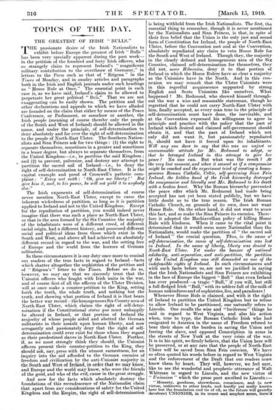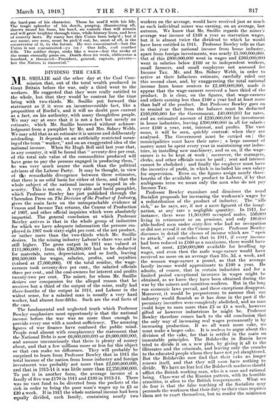TOPICS OF THE DAY.
THE GREATEST OF IRISH " BULLS."
T" passionate desire of the Irish Nationalists to exhibit before Europe the greatest of Irish " Bulls " has been very specially apparent during the past week— in the petition of the hundred and forty Irish officers, who so strangely claim to represent Ireland's " magnificent military contrihution to the overthrow of Germany," in letters to the Press such as that of " Erigena " in the Times of Monday, and in sundry articles and paragraphs both in the Irish and English journals under such headings as " Home Rule at Once." The essential point in each case is, as we have said, Ireland's claim to be allowed to perpetrate her great political " Buli." That we are not exaggerating can be easily shown. The petition and the other declarations and appeals to which we have alluded are founded on the claim that either by means of the Peace Conference, or Parliament, or somehow or another, the Irish people (meaning of course thereby only the people of the South and West of Ireland) should be allowed in the name, and under the principle, of self-determination to deny absolutely and for ever the right of self-determination to the people of North-East Ulster. The Southern Nation- alists and Sind Feiners ask for two things ; (1) the right to separate themselves, sometimes in a greater and sometimes in a lesser degree, but always to separate themselves, from the United Kingdom—i.e., to partition the said Kingdom ; and (2) to prevent, pulverize, and destroy any attempt to partition the sacred soil of Ireland—i.e., to deny the right of self-determination to North-East Ulster. It is the capital example and proof of Cromwell's pathetic com- plaint : " Every sect saith : Oh, give me liberty ! ' But give him it, and, to his power, he will not yield it to anybody else."
The Irish exponents of self-determination of course never mention North-East Ulster, except to curse the inherent wickedness of partition, as long as it is partition applied to Ireland and not to the United Kingdom. Except for the repudiation of partition, you would indeed never imagine that there was such a place as North-East Ulster, or that in the area formed by the Six Counties the majority of the inhabitants were of a different creed, of different racial origin, had a different history, and possessed different social and political ideas from those which exist in the South and West, and above all had achieved an absolutely different record in regard to the war, and the setting free of Europe and the world from the horrors of German militarism.
In these circumstances it is our duty once more to remind our readers of the true facts in regard to Ireland—facts which shatter altogether the sophistries of the petition and of Erigena's " letter to the Times. Before we do so, however, we may say that we sincerely trust that the Unionist officers who fought with Irish units in the war, and of course first of all the officers of the Ulster Division, will at once make a counter-petition to the King, setting forth the truth, the whole truth, and nothing but the truth, and showing what portion of Ireland it is that bears the better war record—the homogeneous Six-County area of North-East Ulster, which claims the right of self-deter- mination if the Constitutional status quo must unhappily be altered in Ireland, or that portion of Ireland the majority of whose people aided and abetted the German militarists in their assault upon human liberty, and now arrogantly and passionately deny that the right of self- determination could ever exist for those whom they regard as their predestined slaves in North-East Ulster. Further, if, as we most strongly think they should, the Unionist officers present their counter-petition to the King, they should ask, nay, press with the utmost earnestness, for an inquiry into the aid afforded to the German enemies of freedom and civilization by the anti-Unionist majority in the South and West of Ireland, in order that we may know, and Europe and the world may know, whowere the friends of the good, and who of the evil; cause in the great struggle.
And now for the facts which absolutely destroy the foundations of this recrudescence of the Nationalist claim that. apart from any considerations of safety for the United Kingdom and the Empire, the right of self-determination
is being withheld from the Irish Nationalists. The first, the essential thing to remember, though it is never mentioned by the Nationalists and Sinn Feiners, is that, in spite of their firm belief that the Union is the only just and sound form of Constitution for Ireland, the people of North-East Ulster, before the Convention met and at the Convention, absolutely repudiated any claim to veto Home Rule for the South and West of Ireland. Though they, the majority in the clearly defined and homogeneous area of the Six Counties, claimed self-determination for themselves, they did not, more Hibernieo, deny it to that portion of Ireland in which the Home Rulers have as clear a majority as the Unionists have in the North. And in this con- nexion we may remark that the Ulster Unionists were in this regretful acquiescence supported by strong English and Scots Unionists like ourselves. What happened ? Mr. Redmond, who showed himself through- out the war a wise and reasonable statesman, though he regretted that he could not carry North-East Ulster with him, finally accepted, as every man true to the principle of self-determination must have done, the inevitable, and at the Convention expressed his willingness to agree in principle and practice with the policy that the part of Ireland which desired and chinned self-government should obtain it, and that the part of Ireland which not only did not want it, but passionately repudiated it, should not have it forced upon its inhabitants. Will any one dare to say that this was an unjust or unreasonable attitude for Mr. Redmond to adopt, or that he betrayed Ireland in this attempt to give her peace? No one can. But what was the result ? At the very last moment, and when it seemed as if a compromise might be reached and the experiment tried of creating a homo- geneous Roman Catholic, Celtic, self-governing Sinn Fein Ireland, the hidden hand of the Irish hierarchy destroyed the compromise and literally sent Mr. Redmond to his death with a broken heart. Why the Roman hierarchy prevented the peace offer which Mr. Redmond had made being accepted has not yet been stated publicly, but we have little doubt as to the true reason. The Irish Roman Catholic Church, on grounds of its own, does not want Home Rule. On the other hand, it did not want to avow this fact, and so make the Sinn Feiners its enemies. There- fore it adopted the Machiavellian policy of killing Home Rule with kindness. When it came to the vital point it determined that it would seem more Nationalist than the Nationalists, would make the partition of " the sacred soil of Ireland" the crucial question. Thus, in the name o' self-determination, the cause of self-determination was lost in Ireland. In the name of liberty, liberty was denied to North-East Ulster. Yet under the banner of national solidarity, anti-separation, and anti-partition, the partition of the United Kingdom was still demanded as one of the Indefeasible rights of Ireland. In such circumstances and with such facts before us, are not we justified in saying that the Irish Nationalists and Sinn Feiners are exhibiting in the face of Europe the biggest " Bull " that even Ireland has ever produced—a tragic "Bull," if you will, but still a full-Hedged Irish "Bull," with its udders full of the milk of human unkindness and of sophistries, lies, and paradoxes1 Whenever Home Rule is claimed, and with it the right of Ireland to partition the United Kingdom but to refuse to allow Ireland to be partitioned, one naturally refers to Lincoln. One recalls the wise and "luciferous" things he said in regard to West Virginia, and also his action when, true to type, the Roman Catholic Irish who had emigrated to America in the name of Freedom refused to bear their share of the burden in saving the Union and freeing the slave, and opposed Conscription in arms in the streets of New York at the very crisis of the war. It is in his spirit, we firmly believe, that the Union here will be preserved, or at any rate that the people of North-East Ulster will be saved from Sinn Fein coercion. We have so often quoted his words before in regard to West Virginia and the enforcement of the Draft that our readers must know them by heart. They will, however, we feel sure, like to see the wonderful and prophetic utterance of Walt Whitman in regard to Lincoln, and the new 'virtue of " Unionism" which the prose poet ascribed to Lincoln:— "Honesty, goodness, shrewdness, conscience, and (a new virtue, unknown to other lands, and hardly yet really known here but the foundation end tie of ell, as the future will grandly developed UNIONISM, in its truest and amplest sense, forre'd the hard-pan of his character. These he ward with his life. Tho tragic splendor of his death, purging, illuminating all, throws round his form, his head, an aureole that will remain and will grow brighter through time, while history lives, and love of country lasts. By many has this Union been help'd ; but if one name, one mau, must be pick'd out, he, most of all, is the conservator of it, to the future. He was assassinated—but the Union is not assassinated--es irn One falls, and smother falls. The soldier drops, sinks like is wave—but the ranks of the ocean eternally press on. Death does its work, obliterates a hundred, a thousand—President, general, captain, private— but the Nation is immortal."







































 Previous page
Previous page